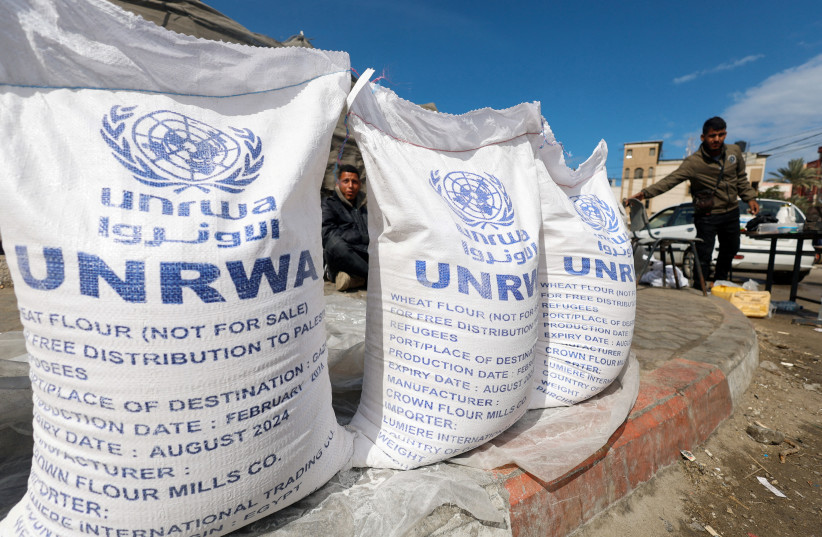Israel’s aid blockade ‘targets life’ in Gaza, Palestinian delegation tells ICJ
Palestinians in the Gaza Strip are in a dire situation due to Israel’s blockade of aid, which began in March, Palestinian representatives told the International Court of Justice in the Hague on Monday.
Throughout the week, representatives from 40 countries will testify on Israel’s decision to ban the United Nations Relief and Works Agency for Palestine (UNRWA), a microcosm of what is seen as Israel’s larger disregard for its international law obligations in the Israel-Hamas War.
The hearings, which will take place throughout this week, will focus on the question of whether Israel – a signatory to the UN Charter – acted against its commitments in banning UNRWA in November.
The Foreign Ministry held its own press conference on the matter.
Israel will not participate in the hearings.

The Palestinian argument
Palestinian representative Amal Hijazi described the dire situation Gazans currently find themselves in, with barely any access to food, water and medicine. He said in his opening remarks that the lack of aid was “supported by the World Court” by default, and the lack of food “targets life itself… [including] by starvation.”
This encompasses Israel’s banning of UNRWA, he said.
Hijazi said that some comments made by several Israeli ministers “debunks the Israeli sham.”
He charged that the killings of UNRWA and other emergency medical staff was “deliberate.”
“These crimes aim to hasten the immediate displacement of the Palestinian people,” he said.
On behalf of Palestine, Paul Reichler took the stage next, addressing Israel’s legal obligations under International Humanitarian Law, specifically concerning starvation.
Reichler cited statements by Defense Minister Israel Katz, Finance Minister Bezalel Smotrich and Energy Minister Eli Cohen, that are aggressive or call for blanket destruction of the Gaza Strip. In Cohen’s place, it was to cut electricity.
Reichler then presented the results of the blockade, citing a UN Security Council briefing from March 18 – these policies are “proudly and loudly proclaimed by Israel’s top officials,” said Reichler.
Citing UN articles that ensure food security and safety, he said that Israel violates them now, and has done so since October 2023.
Addressing Israel’s argument that its security concerns allow for flexibility on these obligations, Reichler said, “This posture is as awful as it is inhumane,” he said.
Background on the ICJ case
In December, the UN’s top court was tasked to form an advisory opinion on Israel’s obligations to facilitate aid to Palestinians that is delivered by states and international groups, including the United Nations. Israel said it would not allow the entry of goods and supplies into Gaza until Hamas releases all 59 remaining hostages.
The resolution adopted in December by 137 of the 193 nations in the UN’s General Assembly called on Israel to comply with its obligations towards the Palestinian population, as it expressed “grave concern” about the dire humanitarian situation.
Israel, the United States and 10 other countries voted against the resolution, while 22 countries abstained.
US President Donald Trump on Friday said he had pushed Prime Minister Benjamin Netanyahu to allow food and medicine into the enclave. The US will state its opinion on Wednesday.
UNRWA supplies medical services, food and education to two million Palestinians in Gaza. The organization was created following the Palestinian refugee crisis after the War of Independence in 1948. There are close to 6 million Palestinian refugees across the Middle East today.
Israel has consistently questioned UNRWA’s authenticity, due to findings, dating years back, that violent sentiments against Israel presented as “resistance” have been found in textbooks taught by UNRWA’s teachers. Over the course of the war, IDF troops in Gaza repeatedly found tunnels and weapons in UNRWA schools.
South Africa brought the larger case against Israel for alleged Genocide Convention violations in December, and hearings took place at the court in January. The hearings this week will focus specifically on the claim of starvation and the state of aid into the enclave.
South Africa argued that Israel violated the 1948 Convention on the Prevention and Punishment of the Crime of Genocide, or the Genocide Convention, by failing to stop it or prosecute public incitement against it, and engaged in it in its acts in Gaza.
Israel has denied these claims, insisting that it sticks to international law and is not using starvation as a method of warfare to enable genocide against the Palestinian people, but rather is fighting Hamas, a terrorist organization deeply embedded in civilian infrastructure in the Gaza Strip.
Reuters contributed to this report.





Comments are closed.